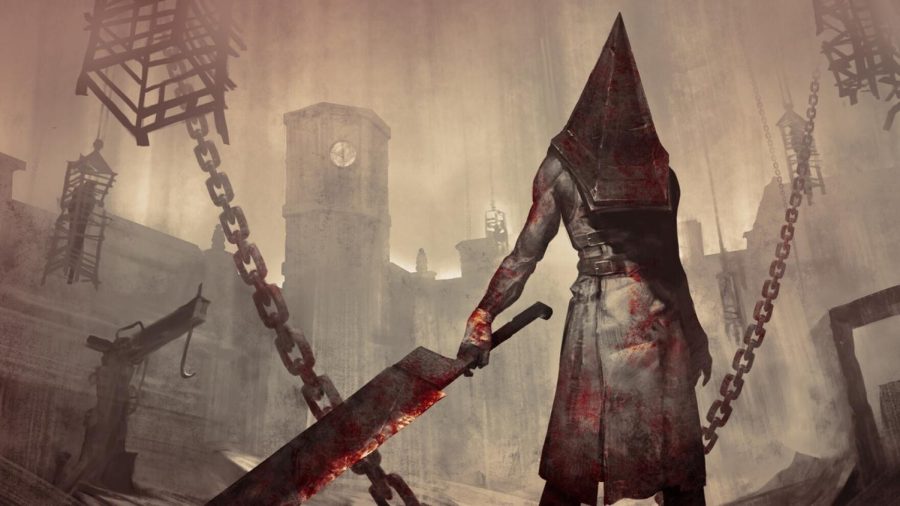*MILD SPOILERS IN THE ARTICLE, BUT MAJOR SPOILERS IN THE LINKS*
In dark times, our first instinct is to survive. No wonder survival horror games are witnessing a rebirth.
The long awaited sequel to “Alan Wake,” a gothic revival of “Alone In The Dark,” remakes of “Resident Evil 4” and “Dead Space”? Talk about a second coming!
The genre reflects an innate desire to process an unfamiliar world and to push through the madness that surrounds us. No franchise seems to reflect this as well as the stalwart “Silent Hill.”
Genesis
Set in a, thankfully, fictional town in Maine, the Keiichiro Toyama created series is a renowned master class in world immersion, psychological tension and disarming sound design; courtesy of Akira Yamaoka and artist Masahiro Ito.
The original “Silent Hill” (1999) starts as a search for a missing daughter, but reveals itself to be something much more heinous. A noted influence on “Stranger Things”, among others, what lurked inside this stone-cold classic were nightmare dimensions, fractured families and a much more disturbing “deal with God.”
Gregorio Velasquez, a senior economics major at San Diego State University, notes how this first entry altered the survival horror landscape.
“There were a lot of unique ideas that were executed in ‘Silent Hill 1’ including many cosmic horror elements; constantly playing off of the unknown and generally just being confusing and uncomfortable,” Velasquez said.
“Silent Hill 2” (2001) went even deeper, delivering a widower’s sobering journey through guilt and an unflinching gaze into the uncanny valley. As is evident from the many video essays it has spawned, fans still regard this entry with equal parts fear and reverence.
“What ‘Silent Hill 2’ did is that it followed individual characters and what they perceived to be their own personal hells,” Velasquez said. “Every future entry, outside of ‘Silent Hill 3’ have played off of the personal side of horror.”
“Silent Hill 3” (2003) finds a teenage girl bound to an unwanted fate, thanks to a self-appointed apostle. A direct sequel to the first game, this scathing treatise on rage, identity and bodily agency resulted in one of the darkest entries in the series — and that’s coming off the heels of its predecessor.
The much more unconventional “Silent Hill 4: The Room” (2004) plumbed the mental depths of a serial killer with maternal conflicts so severe, they’d give Norman Bates pause. Once overlooked, this foray into the intimate terror of isolation has since been reappraised in the years since its release.
When the series left the original developers, collectively known as Team Silent, other entries were released by different developers. While some had their merits, it was understood by many that a certain dark magic was missing; something not even two Hollywood film adaptations could capture.
Enter Hideo Kojima and Guillermo del Toro.
Paradise Lost
The two directors, the former of video games, the “Metal Gear Solid” series, and the latter of films, “Pan’s Labyrinth,” teamed up for 2014’s “P.T.” The insidious “Playable Teaser” for the proposed “Silent Hills” quickly became an instant classic and anticipation for the full game escalated.
Alas, it wasn’t meant to be.
After years of collaboration, Kojima acrimoniously split from series distributor Konami in 2015.
“Hideo Kojima made extremely expensive projects and that cost Konami a lot of money and didn’t give enough money back,” Velasquez said. “As an econ major, it makes sense.”
In the aftermath, “Silent Hills” was banished to its own “Otherworld.” It still remains one of the biggest “what ifs” in recent gaming history.
Following Kojima’s departure, Konami stated that they were “committed to new Silent Hill titles,” but doubts quickly arose and some weren’t afraid to sound off. For the next few years, while its fellow pillars of the genre returned to their roots and reinstated their legacies, “Silent Hill,” well, lived up to its name.
Until October 19th, 2022.
New Testament
Months after a series of leaks, Konami announced a surprise “Silent Hill Transmission” and unveiled four new titles: “Silent Hill f”, “Silent Hill: Townfall”, “Silent Hill: Ascension” and a long-rumored remake and film adaptation of “Silent Hill 2.”
The remake sees them paired up with noted developer Bloober Team (“Layers of Fear”). The mysterious “Townfall” is a collaboration with developer No Code (“Stories Untold”) and distributor Annapurna Interactive (“Stray”). “Ascension” experiments with player interactivity and “Silent Hill f”, penned by Ryukishi07 (“Higurashi”), pulls a narrative 180; shifting from its usual setting to 1960s Japan.
Obviously, it’s been a long time coming, but why is Konami delivering so much after so long?
Velasquez notes that, in order to make up for lost time and trust, “Konami is focusing more on experimenting with the ‘Silent Hill’ series. They’re definitely testing the waters to see what the fans truly want, whether they want something old or something new; they’re trying to see which side of the fandom they should focus on.”
Hopefully, this will be a much more satisfying “homecoming” for loyal fans – either way, welcome back to Silent Hill.







